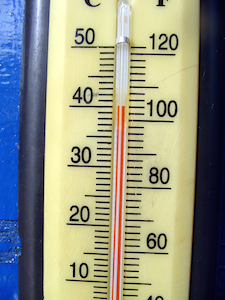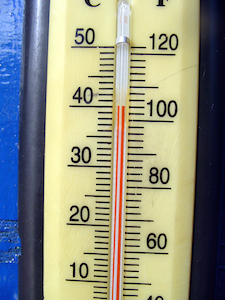 Temperatures in the upper 90s – over 100 perhaps? When the National Weather Service issues an excessive heat watch you need to wise up and take some basic precautions.
Temperatures in the upper 90s – over 100 perhaps? When the National Weather Service issues an excessive heat watch you need to wise up and take some basic precautions.
An excessive heat watch means that a prolonged period of hot temperatures is expected. The combination of hot temperatures and high humidity will create a dangerous situation in which heat illnesses are possible for you, your family and your coworkers.
Take precautions from the heat:
• It’s obvious. But drink plenty of water or other non-alcohol or decaffeinated fluids. Your body needs water to keep cool. Drink plenty of fluids even if you don’t feel thirsty. Do not drink alcoholic beverages and limit caffeinated beverages.
• Stay in an air-conditioned room. Air conditioning in homes and other buildings markedly reduces danger from the heat. Consider spending the warmest part of the day in public buildings such as libraries, schools, movie theaters, shopping malls and other community facilities.
• Circulating air can cool the body by increasing the perspiration rate of evaporation. According to the Centers for Disease Control and Prevention (CDC), electric fans may provide comfort, but when the temperature is in the high 90s, fans will not prevent heat-related illness. Taking a cool shower or bath, or moving to an air-conditioned place is a much better way to cool off.
• Stay out of the sun and don’t get too much sun. Sunburn reduces your body’s ability to dissipate heat.
• Avoid strenuous work during the warmest part of the day. Use a buddy system when working in extreme heat, and take frequent breaks.
• Dress for summer. Wear lightweight, light-colored clothing to reflect heat and sunlight.
• Make sure your child’s safety seat and safety belt buckles aren’t too hot before securing your child in a safety restraint system, especially when your car has been parked in the heat.
• Never leave your child or pet unattended in a vehicle, even with the windows down.
• Make sure pets have plenty of fresh water and are not left outside for long periods.
• Those at greatest risk for heat-related illness include infants and children up to four years of age, people 65 years of age and older, people who are overweight, and people who are ill or on certain medications. Visit adults at risk at least twice a day and closely watch them for signs of heat exhaustion or heat stroke. Infants and young children, of course, need much more frequent watching.
 Learn the difference between heat disorders – sunburn, heat cramps, heat exhaustion and heat stroke. Details and other summer safety tips can be found at this local county’s resources page: http://www.fairfaxcounty.gov/emergency/prepare/summer/heat-safety.htm.
Learn the difference between heat disorders – sunburn, heat cramps, heat exhaustion and heat stroke. Details and other summer safety tips can be found at this local county’s resources page: http://www.fairfaxcounty.gov/emergency/prepare/summer/heat-safety.htm.
Weather.com has a cool app which will alert you to your local weather and pollen conditions. It will squawk at you if there is a weather-related risk to life or limb.
